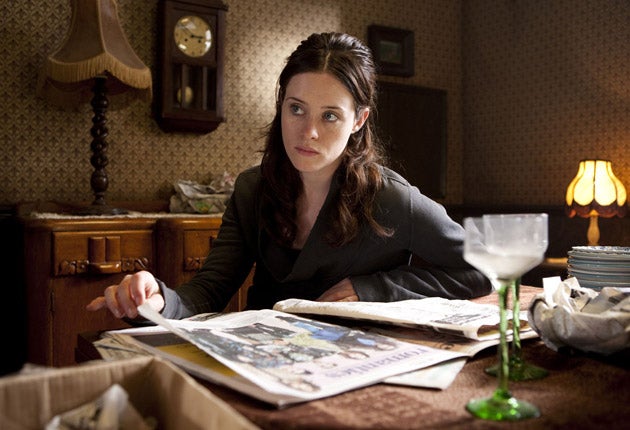The Promise, Channel 4, Sunday<br/>Mad Dogs, Sky 1, Thursday
Peter Kosminsky's drama recalls how British troops had to beat and herd Holocaust survivors into detention camps

Your support helps us to tell the story
From reproductive rights to climate change to Big Tech, The Independent is on the ground when the story is developing. Whether it's investigating the financials of Elon Musk's pro-Trump PAC or producing our latest documentary, 'The A Word', which shines a light on the American women fighting for reproductive rights, we know how important it is to parse out the facts from the messaging.
At such a critical moment in US history, we need reporters on the ground. Your donation allows us to keep sending journalists to speak to both sides of the story.
The Independent is trusted by Americans across the entire political spectrum. And unlike many other quality news outlets, we choose not to lock Americans out of our reporting and analysis with paywalls. We believe quality journalism should be available to everyone, paid for by those who can afford it.
Your support makes all the difference.Fashioning a coherent drama out of the tangled history of the Arab-Israeli conflict might seem as Sisyphean a task as trying to knit a jumper from spaghetti.
But then director Peter Kosminsky has never been one to shirk big issues; from the war in Bosnia to the death of David Kelly, indeed, his artistic raison d'être has been to go boldly where other programme-makers fear to tread. And if his boldness tripped him up with 2007's crudely controversial terrorist thriller Britz, then The Promise finds him back at his thought-provoking best.
Structurally, at least, this four-parter occupies reassuring territory, its parallel storylines linked by the contrivance of an unearthed diary. In 1945, we followed Len, one of the 100,000 soldiers serving in British Mandate Palestine, ostensibly as peacekeepers but achieving anything but. And in 2005, there was Erin (Claire Foy), his spectacularly surly granddaughter chancing upon her grandad's Middle Eastern memoirs while clearing out his Leeds house. Unconventional holiday reading in hand, she took up her Anglo-Israeli friend Eliza's fortuitous invitation to spend the summer with her family in Tel Aviv. Cue a crash course in the afflictions of modern Israel for Erin, while Len's story laid bare their roots.
And what bizarrely forgotten roots they are: or was I the only one ashamed at my ignorance of this murky chapter in our military's history? A character forged from interviews with 80 veterans, Len came to Palestine from liberating the prisoners of Bergen-Belsen; it was with a terrible irony, therefore, that we saw Len and his comrades herding boatloads of "surplus" Jewish refugees back into camps. ("These people have suffered enough and we responded with barbed wire and baseball bats. It weren't right," he scribbled despairingly.) But when the Brits' strong-arming spawned accusations of Nazism and Zionist militant attacks, even this good soldier found himself swallowed up in the moral morass, his compassion for the settlers atrophying into anger, despite his affair with a Jewish woman. In these scenes, aided by a superb performance of clenched anguish from Christian Cooke, Kosminsky balanced the demands of big-picture history and intimate human drama with a quite remarkable assurance.
Contrastingly, the modern-day storyline was hobbled by an inertia that seemed at odds with its tumultuous subject matter. If wide-eyed Erin was a device to give us what Hollywood might call a "relatable" jumping-off point, then a device was what she remained. By the same token, other characters were stuck spewing unreconstituted chunks of opinion as her unofficial tutors – not least Eliza's peace activist brother Paul, whose anti-Zionist polemic dominated the episode's final third. Was this the series declaring its political hand?
Well, no, as it turned out, for it rounded off with a terrible and subversive flourish: a Palestinian suicide bombing, in which Paul was one of the victims. It was a cliffhanger of the highest order, redefining the entire dramatic landscape – Erin, it is safe to assume, will be a passive observer no longer – while leaving us dangling in a moral no-man's-land far from the footholds of our received opinions. Coherent drama, did I say? The Promise promises to be too clever to bother with that.
I can't say I was looking forward to Mad Dogs, Sky 1's latest, heavily marketed, glossily rendered attempt to establish itself in the original drama market. A holiday-from-hell thriller, it stars Philip Glenister, John Simm, Max Beesley and Marc Warren as middle-aged blokes living it large at the plush Majorca villa of a mysteriously "retired" old mate just as his shady past comes back to haunt him.
But, for all that, the premise sounded like a Nuts magazine reader's wet dream, the first episode coasted by in unduly entertaining fashion. Coming on like "Sexy Beast Behaving Badly in a Shallow Grave", the plot carried a breezy momentum somehow all the better for its shameless derivativeness, and there was fun to be had in the prickly, comic chemistry of our lead quartet, their forced bonhomie barely disguising eggshell-thin egos. Best of, meanwhile, was former next-big-thing Ben Chaplin, on supremely unctuous form as their slowly unravelling host.
Shame, though, that Chaplin was sleeping with the Balearic fishes by the end of the hour – thanks to a bullet in the head from an assassin in a Tony Blair mask, no less. And is that an obscure attempt at satire I see before me? Best leave politics to the big boys, lads.
Join our commenting forum
Join thought-provoking conversations, follow other Independent readers and see their replies
Comments